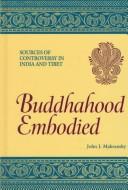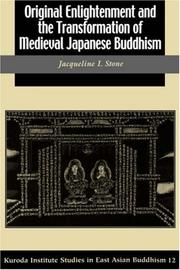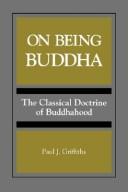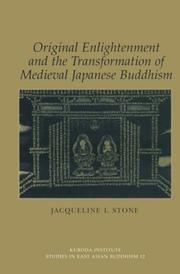| Listing 1 - 10 of 13 | << page >> |
Sort by
|

ISBN: 079143432X 9780791434321 Year: 1997 Publisher: Albany (N.Y.) : State university of New York press,
Abstract | Keywords | Export | Availability | Bookmark
 Loading...
Loading...Choose an application
- Reference Manager
- EndNote
- RefWorks (Direct export to RefWorks)

ISBN: 9780824827717 0824827716 Year: 2003 Publisher: Honolulu: University of Hawai'i Press,
Abstract | Keywords | Export | Availability | Bookmark
 Loading...
Loading...Choose an application
- Reference Manager
- EndNote
- RefWorks (Direct export to RefWorks)
Tendai (Sect) --- Buddhahood --- Buddhism --- Tendai (Sect)

ISBN: 0585088713 9780585088716 0791434311 079143432X 1438411766 Year: 1997 Publisher: Albany, NY State University of New York Press
Abstract | Keywords | Export | Availability | Bookmark
 Loading...
Loading...Choose an application
- Reference Manager
- EndNote
- RefWorks (Direct export to RefWorks)
To enter the Mahayana Buddhist path to enlightenment is to seek both to become free from our dualistic, deluded world and to remain actively engaged in that world until all others are free. How are these two apparently contradictory qualities to be embodied in the attainment of buddhahood (dharmakaya)? How can one's present practice accomplish that? These questions underlie a millennium-old controversy over buddhahood in India and Tibet that centers around a cherished text, the Abhisamayalamkara. Makransky shows how the Abhisamayalamkara's composite redaction, from Abhidharma, Prajnaparamita, and Yogacara traditions, permitted its interpreters to perceive different aspects of those traditions as central in its teaching of buddhahood. This enabled Indians and Tibetans to read very different perspectives on enlightenment into the Abhisamayalamkara, through which they responded to the questions in startlingly different ways.The author shows how these perspectives provide alternative ways to resolve a logical tension at the heart of Mahayana thought, inscribed in the doctrine that buddhahood paradoxically transcends and engages our world simultaneously. Revealing this tension as the basis of the Abhisamayalamkara controversy, Makransky shows its connection to many other Indo-Tibetan controversies revolving around the same tension: disagreements over buddhahood's knowledge, embodiment, and accessibility to beings (in Buddha nature and through the path). Tracing the source of tension to early Mahayana practice intuitions about enlightenment, the author argues that different perspectives in these controversies express different ways of prioritizing those practice intuitions.
Buddhahood. --- Abhisamayālaṅkāra --- Bodhisattvahood --- Buddhaship --- Buddhism

ISBN: 0585045011 9780585045016 0791421279 0791421287 1438404964 Year: 1994 Publisher: Albany, N.Y. State University of New York Press
Abstract | Keywords | Export | Availability | Bookmark
 Loading...
Loading...Choose an application
- Reference Manager
- EndNote
- RefWorks (Direct export to RefWorks)
Buddha (The concept) --- Buddhahood. --- Buddhahood --- Religion --- Philosophy & Religion --- Buddhism --- Bodhisattvahood --- Buddhaship --- Buddha and Buddhism --- Buddhakāya (Buddhism) --- Dharmakāya (Buddhism) --- Nirmāṇakāya (Buddhism) --- Sambhogakāya (Buddhism) --- Tathāgata (Buddhism) --- Trikāya (Buddhism) --- Doctrines
Book
ISBN: 9781409417989 9781409417996 9781409418009 1409417999 1409417980 1409418006 9781315574912 9781317157588 9781317157595 9781138254756 Year: 2011 Publisher: Farnham, Surrey Ashgate Publishing Limited
Abstract | Keywords | Export | Availability | Bookmark
 Loading...
Loading...Choose an application
- Reference Manager
- EndNote
- RefWorks (Direct export to RefWorks)
In the late 1980s and early 1990s, the relative calm world of Japanese Buddhist scholarship was thrown into chaos with the publication of several works by Buddhist scholars Hakamaya Noriaki and Matsumoto Shiro, dedicated to the promotion of something they called Critical Buddhism (hihan bukkyo). In their quest to re-establish a "true" - rational, ethical and humanist - form of East Asian Buddhism, the Critical Buddhists undertook a radical deconstruction of historical and contemporary East Asian Buddhism, particularly Zen. While their controversial work has received some attention in English-language scholarship, this is the first book-length treatment of Critical Buddhism as both a philosophical and religious movement, where the lines between scholarship and practice blur. Providing a critical and constructive analysis of Critical Buddhism, particularly the epistemological categories of critica and topica, this book examines contemporary theories of knowledge and ethics in order to situate Critical Buddhism within modern Japanese and Buddhist thought as well as in relation to current trends in contemporary Western thought.
Buddhism --- Religion. --- Doctrines. --- Rituals & Practice. --- Buddhist philosophy --- Philosophy, Japanese --- Bouddhisme --- Philosophie bouddhique --- Philosophie japonaise --- History --- Histoire --- Doctrines --- Buddhahood --- Buddhism - Japan - History - 1945 --- -Buddhism - Doctrines --- Philosophy, Japanese - 20th century --- Japan --- modern Zen thought --- modern Japanese Buddhist tought --- japanese religions --- Zen Buddhism
Book
ISBN: 9781405189071 9781405189064 Year: 2014 Publisher: Chichester, West Sussex John Wiley & Sons Ltd
Abstract | Keywords | Export | Availability | Bookmark
 Loading...
Loading...Choose an application
- Reference Manager
- EndNote
- RefWorks (Direct export to RefWorks)
Theravāda Buddhism. --- Theravāda Buddhism --- Social aspects. --- Buddha --- Buddhahood --- Buddha worship --- Dhamma --- the Jataka --- meditation --- Abhidhamma --- Sangha and society --- monks --- monasteries --- women in Monasticism --- women in Theravada literature and society --- feminist readings of gender-related symbols --- nonharming --- politics --- violence --- Theravada Buddhism

ISBN: 0791421287 0791421279 9780791421277 9780791421284 Year: 1994 Publisher: Albany, N.Y. State University of New York Press
Abstract | Keywords | Export | Availability | Bookmark
 Loading...
Loading...Choose an application
- Reference Manager
- EndNote
- RefWorks (Direct export to RefWorks)
Buddha (The concept) --- Buddhahood. --- Buddhahood --- 294.3 <540> --- 294.3 <540> Boeddhisme--(algemeen)--India --- 294.3 <540> Boeddhisme:--verder in te delen zoals 291.1/.8--India --- Boeddhisme--(algemeen)--India --- Boeddhisme:--verder in te delen zoals 291.1/.8--India --- Bodhisattvahood --- Buddhaship --- Buddha and Buddhism --- Buddhakāya (Buddhism) --- Dharmakāya (Buddhism) --- Nirmāṇakāya (Buddhism) --- Sambhogakāya (Buddhism) --- Tathāgata (Buddhism) --- Trikāya (Buddhism) --- Buddhism --- Doctrines

ISBN: 0824820266 Year: 2003 Publisher: Honolulu University of Hawaii press
Abstract | Keywords | Export | Availability | Bookmark
 Loading...
Loading...Choose an application
- Reference Manager
- EndNote
- RefWorks (Direct export to RefWorks)
Buddhahood --- Buddhism --- Tendai (Sect) --- History. --- History --- Doctrines --- Relations --- J1800.40 --- J1809 --- J1873 --- Tiantai Buddhism --- Bodhisattvahood --- Buddhaship --- Doctrines&delete& --- Relations&delete& --- Japan: Religion -- Buddhism -- history -- Kamakura period, Yoshino (1185-1392) and Chūsei in general (1185-1600) --- Japan: Religion -- Buddhism -- theory, methodology and philosophy --- Japan: Religion -- Buddhism -- Tendai

ISBN: 9042013591 Year: 2002 Publisher: Amsterdam / New York, NY Editions Rodopi B.V.
Abstract | Keywords | Export | Availability | Bookmark
 Loading...
Loading...Choose an application
- Reference Manager
- EndNote
- RefWorks (Direct export to RefWorks)
Daisaku Ikeda --- spirituality --- education --- Soka education --- Buddhism --- humanism --- Nichiren Daishonin --- 1253 --- enlightenment --- Tsunesaburo Makiguchi --- Humanist Manifesto I --- Makiguchi's philosophy of education --- the ten states of being --- Bodhisattva --- Buddhahood --- Ichinen Sanzen --- the causality of karma --- Kosen-Rufu --- value creation --- self-mastery --- faith --- the superrational --- Lao Tzu --- Plato --- John Stuart Mill --- Alfred North Whitehead --- John Dewey --- Antonio Gramsci --- Martin Luther King, Jr. --- Paolo Freire --- Howard Gardner --- George David Miller --- reductionism --- nihilism --- apathy --- intolerance --- international education --- school systems
Book
ISBN: 1400832594 Year: 2005 Publisher: Princeton, N.J. : Princeton University Press,
Abstract | Keywords | Export | Availability | Bookmark
 Loading...
Loading...Choose an application
- Reference Manager
- EndNote
- RefWorks (Direct export to RefWorks)
Popular understanding of Zen Buddhism typically involves a stereotyped image of isolated individuals in meditation, contemplating nothingness. This book presents the "other side of Zen," by examining the movement's explosive growth during the Tokugawa period (1600-1867) in Japan and by shedding light on the broader Japanese religious landscape during the era. Using newly-discovered manuscripts, Duncan Ryuken Williams argues that the success of Soto Zen was due neither to what is most often associated with the sect, Zen meditation, nor to the teachings of its medieval founder Dogen, but rather to the social benefits it conveyed.Zen Buddhism promised followers many tangible and attractive rewards, including the bestowal of such perquisites as healing, rain-making, and fire protection, as well as "funerary Zen" rites that assured salvation in the next world. Zen temples also provided for the orderly registration of the entire Japanese populace, as ordered by the Tokugawa government, which led to stable parish membership.Williams investigates both the sect's distinctive religious and ritual practices and its nonsectarian participation in broader currents of Japanese life. While much previous work on the subject has consisted of passages on great medieval Zen masters and their thoughts strung together and then published as "the history of Zen," Williams' work is based on care ul examination of archival sources including temple logbooks, prayer and funerary manuals, death registries, miracle tales of popular Buddhist deities, secret initiation papers, villagers' diaries, and fund-raising donor lists.
Såotåoshåu --- Social aspects --- Akadama Jinkyōgan. --- Akutsu Shōemon. --- Amida Buddha. --- Aruga Kizaemon. --- Birnbaum, Raoul. --- Buddhahood. --- Butsujō. --- Chōjuin Temple. --- Daiyūgan. --- Daranisuke. --- Dharma name. --- Dharma succession. --- Dōryō Daigongen. --- Enjōji Temple. --- Funrei. --- Gedokuen. --- Gokūshiki. --- Hakone Betsuin. --- Hatano Yoshishige. --- Hirose Ryōkō. --- Ichimantai Jizō. --- Ishikawa Rikizan. --- Izumiya Sakuemon. --- Jippensha Ikku. --- Jōdo Shin sect. --- Kakumon. --- Kangakuya pharmacy. --- Kurozumikyō. --- LaFleur, William. --- Lalou, Marcelle. --- Machida incident. --- Mahayana Buddhism. --- Nakagawa Sugane. --- afterlife imagery. --- ancestors. --- bodhisattva cult. --- ceramic plate priests. --- childbirth rites. --- common religion. --- confraternities. --- continuity model. --- eagle legends. --- faith healing. --- fires and firefighting. --- funerary Buddhism. --- ghost sleeves. --- hidden or secret Buddha. --- homeless people. --- imperial household. --- infanticide. --- kaimyō. --- magical therapeutics.
| Listing 1 - 10 of 13 | << page >> |
Sort by
|

 Search
Search Feedback
Feedback About UniCat
About UniCat  Help
Help News
News